All He Ever Wanted: A Novel
[Book]
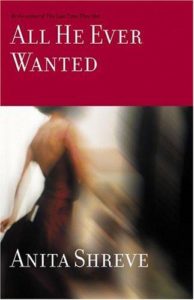
view/request
If you like dark, involving, character-driven tales, pick up this one about a professor at a small New England college at the turn of the last century. The unlikable, perhaps unreliable narrator is writing an account of his obsession with a woman he met by chance, is instantly enthralled with, and ultimately marries. I didn’t so much enjoy this very well written “memoir” as was possessed by it. As the object of the narrator’s desires, we see the female character only through the narrator’s eyes and she remains enigmatic. As is Shreve’s modus operandi there is another interlocking tale written years later called Stella Bain. Perhaps these characters stayed with the author as they did with me.
Reviewed by Linda
Tagged: Academia, Fiction, Historical fiction, Obsession
High Tide in Tucson: Essays From Now or Never
by Barbara Kingsolver
[Book]

view/request
Written in the 1990s but still every bit as pertinent and fresh, this series of essays from the novelist is about nature, single motherhood, and musings about cultures and politics (oddly prescient). Most of the essays were previously published in magazines, but were revised for inclusion in the book. Kingsolver pays close attention to her natural and human surroundings whether she is in Africa or her home turf of Kentucky, or her current abode in the desert. Some essays are funny, some lump-in-the-throat poignant; all are highly recommended.
Reviewed by Linda
Tagged: Essays, Mindfulness, Nature, Non-fiction
Foreigner: A Novel of First Contact
by C. J. Cherryh
[Book]
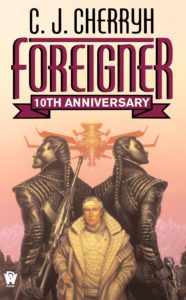
view/request
The subtitle of C. J. Cherryh’s novel Foreigner is “a Novel of First Contact”. The novel begins with a brief prelude in which a starship is flung off course and and its passengers and crew find refuge on a previously unknown world where their first encounter with the local inhabitants has a fairly promising start. This is not a typical first contact story, however, because the novel then jumps several centuries into the future, and we find that relations between the indigenous population and the foreigners are mired in misunderstandings and ignorance.
As it turns out, the indigenous Atevi and the foreign humans found they had a common interest in slowing down contact between their two peoples. After some disastrous misunderstandings a treaty is formed to limit human-Atevi contact. According to the treaty the humans are given an island on which to live, the Atevi have the rest of the world, and contact between the two species is channeled through a single human translator/diplomat known as the paidhi. This worked well; for generations humans and Atevi both prospered, and for generations of paidhi the job consisted of attending meetings and writing dictionaries. Foreigner tells the story of Bren Cameron, a young paidhi whose plans for a quiet life of linguistics and tedious but routine bureaucracy must be exchanged for intrigue, politics, and outright violence—and he doesn’t even know why. Cherryh’s narration alternates between Bren’s awkward interactions with his Atevi hosts, which increasingly involve attempted assassinations, espionage, and uncertain alliances, and his internal monologues as he tries to make sense of his increasingly incomprehensible situation. Suddenly, things are changing very rapidly. Bren is the only human with a chance of comprehending what the changes mean to the Atevi. Is Bren the world’s only hope at keeping peace?
Foreigner is the first novel in a long series (nineteen novels have been published so far) and is perfect for folks that like long character arcs, anthropological sci-fi, deliberate pacing, and complex relationships.
Reviewed by Ben
Tagged: Fiction, Science fiction
Tipping Point: The War With China—The First Salvo
by David Poyer
[Book]
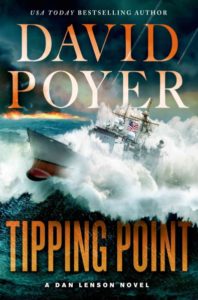
view/request
Set in a near future near and far east on the brink of war(s), this addition to a long series about naval officer Dan Lemson doesn’t require you to know his back story. Nor is this about, as the publisher would have you think, the potential for a war with China. That is only the background to a very well drawn psychological tale of a commanding officer under stress, with realistic problems, human and mechanical. Applicable to management dilemmas, except of course in this case, errors can cause death. An anti-war tale of how wars are “sleep-walked” into, and how those on the front lines are puppets to the orders from those safely at home. Not much resolution of issues by the end of the story, several books follow this tale.
Reviewed by Linda
Tagged: Fiction, Naval stories, Sea stories, War stories
Spinning Silver
by Naomi Novik
[Book]
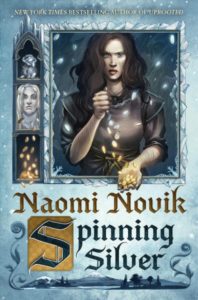
view/request
Spinning Silver is a fairy-tale inspired fantasy set in Lithvas, a fictional country with with elements of Lithuanian, Polish, and Russian history and culture. The kingdom is ruled by a tsar. The economy is largely agrarian with barley and wool playing an important role. Winters are harsh. With its combination of Eastern European culture, fairy-tale like magic, and modern sensibilities, Spinning Silver has much in common with Naomi Novik’s Uprooted, and folks who enjoyed Uprooted will enjoy Spinning Silver as well. That said, Spinning Silver is the darker and more complicated story, and much of that complexity and darkness comes from a simple fact: Miryem, the central character in the novel, and her family are Jews.
Though much of Spinning Silver is fantasy, the antisemitism that shapes the outlook of so many of its characters is not. Novik said in an interview with Paste magazine that “Spinning Silver is about my father’s family, and they were Lithuanian Jews who had to escape persecution”. Distrust is high and misunderstandings are common (Wanda, a farm girl, mistakes the family’s sabbath prayer for a magical spell), and Miryem and her family are always aware that their lives could be disrupted by anti-Jewish violence. And as moneylenders their role in the local economy is both welcome and despised.
Spinning Silver is about value and assessment, debts and promises, trades and bargains. Miryem’s strength comes ultimately from her recognition of her own worth and her insistence on not being undervalued. And Miryem, Wanda, and Irina, the three main women in the story, are all remarkable for their cool level-headedness and practical outlook. Whether trading in the market, bargaining with an otherworldly ice king, exorcising a demon, or deciding whether or not to accept the hand of suitor, these women stand up for themselves and make careful, calculated decisions. In Spinning Silver these well reasoned decisions and difficult compromises are celebrated and, at least in Miryem’s case, elevated to the point of high magic.
Spinning Silver is one of the most enjoyable books I have read this summer. If you enjoy a good fairy tale I highly recommend you give it a try.
Reviewed by Ben
Tagged: Fairy tales, Fantasy, Fiction, Women
Hunger: A Memoir of (My) Body
by Roxane Gay
[Book]
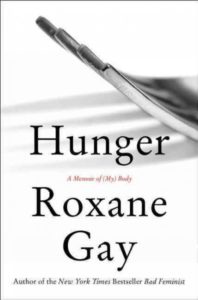
view/request
Roxane Gay’s memoir Hunger: A Memoir of (My) Body is startling. It is moving and important. It is hard to read and hard to put down.
In this memoir of her body Gay puts into words so much that would generally be left unsaid. Gay’s writing is clear and concise. It does not shy from the contradictions in life. It is both restrained and emotional. It is devastating. Gay tells us about her life. She was raped at the age of twelve. She is fat. She is scared. She is complex, intelligent, insightful, compassionate, and a brilliant writer. She lives a privileged life and recognizes her privilege. She is the subjected to great prejudice and discrimination. In Hunger she shares truths that must be incredibly difficult to share and she does so very well.
Gay’s book tells us much about her life, but it also tells us much about our culture, our country, our attitudes. We are not kind to fat bodies. We are not kind to women’s bodies. We are not kind to black bodies. We are not kind to ourselves. You probably already know this, but Gay’s book will still open your eyes. Her perspective is probably not one you have heard before.
On the back of the dust jacket Ann Patchett tells us why this book is important and I cannot improve on what she says. She writes:
“It turns out that when a wrenching past is confronted with wisdom and bravery, the outcome can be compassion and enlightenment—both for the reader who has lived through this kind of unimaginable pain and for the reader who knows nothing of it. Roxane Gay shows us how to be decent to ourselves and decent to one another. Hunger is an amazing achievement in more ways than I can count.”
Reviewed by Ben
Tagged: Memoir, Non-fiction, Trauma, Women
Census
by Jesse Ball
[Book]
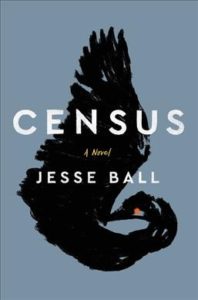
view/request
How does one convey a sense of understanding about something that is significantly hard to describe – whether due to its ephemeral qualities, or because the subject is profoundly personal? Author Jesse Ball writes about this challenge in the introduction to his newest book Census, stating that he “realized I would make a book that was hollow,” when trying to figure out how to write about his deceased older brother. Ball makes an astounding attempt by writing around the difficulty being investigated, and so creates a contour by which details emerge and a sense of the indescribable can be gleaned.
A book perhaps essentially about empathy, on both a personal and cultural level – prescient of our current social atmosphere where some philosophy on understanding others might be a bit lacking. Written with simple yet poetic prose, which will likely garner the re-reading of passages when finding yourself bowled over by the dense sentiments embedded within a short paragraph. And an impressive amount of language pushing, which holds up against the steep standards placed by the comparisons to Borges and Calvino that Ball has received. Truly otherworldly writing in the best ways that those giants of literature have shown to be possible.
A road trip from towns A to Z with tattooing and physiotelepathy – this is my current favorite book of 2018!
Reviewed by Josh
Tagged: Experimental, Families, Fiction, Literary fiction
Close to Home
by Peter Robinson
[Book]
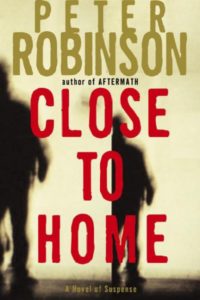
view/request
This is the first title by this prolific British author I’ve sampled, and I’m hooked. Well written with interesting main characters both male and female. Suspenseful, but not heart pounding. You can, as I did, dive in into the middle of the Inspector Banks series, as the back stories of the main characters are interwoven into the story as necessary. For lovers of British mysteries like the Inspector Morse stories.
Reviewed by Linda
Tagged: British, Fiction, Mystery, Thriller
The Swamp: The Everglades, Florida, and the Politics of Paradise
by Michael Grunwald
[Book]
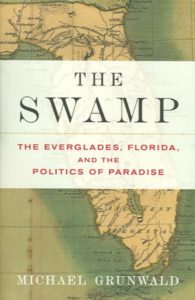
view/request
If you have ever visited the Everglades, (or what’s left of it) you know it is a marsh, not a swamp. The swamp of the title refers to the name commonly, especially in previous centuries, assigned to it by non-specialists, but even more to the morass of politics that has alternatively consigned it to death, and pushed it back from the brink. This is a book for observers and students of political strategy and American history. Yes, there are ecological lessons here, but it is more a tale of why some people become environmental activists (some very surprising stories), and why some have a different vision for the future, and of their continuing battles for the future of the Everglades, and by extension, south Florida.
Reviewed by Linda
Tagged: Non-fiction, Politics
Passage
by Connie Willis
[Book]
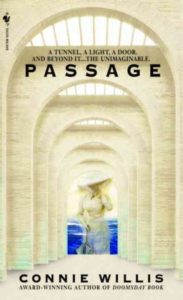
view/request
This is a difficult-to-classify tale of a medical researcher studying near death experiences. An interesting cast of characters of different races and backgrounds populate the novel and the story takes several turns, mostly unexpected. The politics and gossip and in a hospital setting are realistically portrayed. For mystery lovers who don’t mind a touch of medical-science-fiction. And for the philosophically inclined lover of escape fiction. A bit of a spooky read, and not everyone lives happily ever after. I found the main character a bit exasperating. But I had trouble putting it down until the end.
Reviewed by Linda
Tagged: Fiction, Mystery, Science fiction
The Fifth Season
by N. K. Jemisin
[Book]
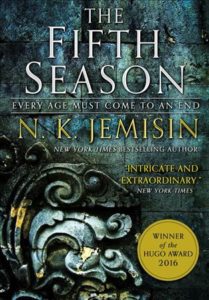
view/request
The Fifth Season is the first in The Broken Earth trilogy, a complex narrative work of fantasy that tells the tale of a world that may once have been like our own Earth, but has suffered from repeated environmental catastrophe’s, the “fifth seasons” of the book’s title. The world is frequently subjected to seismic stresses and acid rains and societal breakdowns. To survive,folks rely on the knowledge—and prejudice—passed down as “stone lore”.
The Fifth Season paints a detailed vision of a world with a rich but incomplete history full of deep prejudices and injustices, its own unique vocabulary, and a magical system that is almost scientific. It ends on a cliff-hanger, so you’ll want to read the whole series!
Reviewed by Ben
Tagged: Fantasy, Fiction, Science fiction
Report to the Men’s Club
by Carol Emshwiller
[Book]
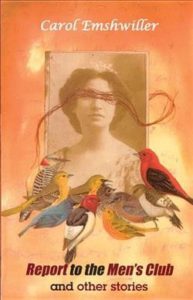
view/request
Though we’ve labeled this science fiction, for the most part these short stories are magic realism, little worlds where everything is normal, except perhaps, grandma can fly. Some funny, some a bit macabre (think Joyce Carol Oates with a sense of humor.) One is a paean to a feminist anthropologist, many about the lives of women. They will stick with you after the volume is closed.
Reviewed by Linda
Tagged: Fiction, Humor, Magical realism, Short stories












